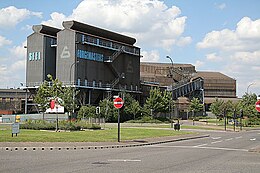
Vickers was a British engineering company that existed from 1828 until 1999. It was formed in Sheffield as a steel foundry by Edward Vickers and his father-in-law, and soon became famous for casting church bells. The company went public in 1867, acquired more businesses, and began branching out into military hardware and shipbuilding.
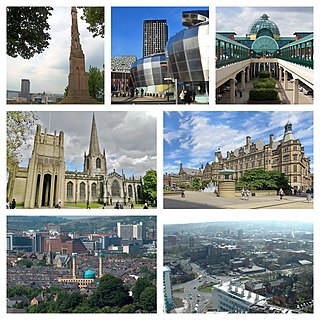
Sheffield is a city in South Yorkshire, England, whose name derives from the River Sheaf which runs through it. The city serves as the administrative centre of the City of Sheffield. It is historically part of the West Riding of Yorkshire and some of its southern suburbs were transferred from Derbyshire to the city council. It is the largest settlement in South Yorkshire.

Rolls-Royce Holdings plc is a British multinational aerospace and defence company incorporated in February 2011. The company owns Rolls-Royce, a business established in 1904 which today designs, manufactures and distributes power systems for aviation and other industries. Rolls-Royce is the world's second-largest maker of aircraft engines and has major businesses in the marine propulsion and energy sectors.
Outokumpu Oyj is a group of international companies headquartered in Helsinki, Finland, employing 10,600 employees in more than 30 countries. Outokumpu is the largest producer of stainless steel in Europe and the second largest producer in the Americas. Outokumpu also has a long history as a mining company, and still mines chromium ore in Keminmaa for use as ferrochrome in stainless steel. The largest shareholder of Outokumpu is the Government of Finland, with 26.6% ownership, including the shares controlled by Solidium, The Social Insurance Institution of Finland, Finnish State Pension Fund and Municipality Pension Agency.
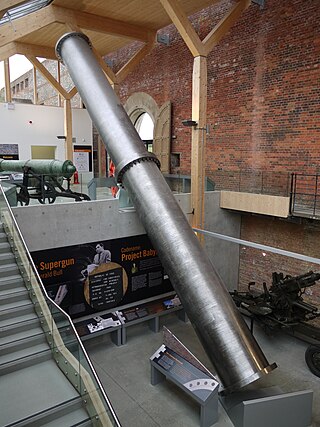
Project Babylon was a space gun project commissioned by then Iraqi president Saddam Hussein. It involved building a series of "superguns". The design was based on research from the 1960s Project HARP led by the Canadian artillery expert Gerald Bull. There were most likely four different devices in the program.

Vickers plc was the remainder of Vickers-Armstrongs after the nationalisation of three of its four operating groups: aviation, shipbuilding and steel. It was purchased by Rolls-Royce plc in 1999, and the Vickers company name became defunct in 2003 as Rolls renamed the company Vinters Engineering.
Heavy Engineering Corporation Limited or "HECL" is a Public Sector Undertaking ("PSU") in Ranchi, Jharkhand, India. HECL was established in the year 1958 as one of the largest Integrated Engineering Complex in India. It manufactures and supplies capital equipments & machineries and renders project execution required for core sector industries. It has complete manufacturing set up starting from casting & forging, fabrication, machining, assembly and testing - all at one location, Ranchi, backed by a strong design - engineering and technology team.
Vickers Limited was a British engineering conglomerate. The business began in Sheffield in 1828 as a steel foundry and became known for its church bells, going on to make shafts and propellers for ships, armour plate and then artillery. Entire large ships, cars, tanks and torpedoes followed. Airships and aircraft were added, and Vickers jet airliners were to remain in production until 1965.
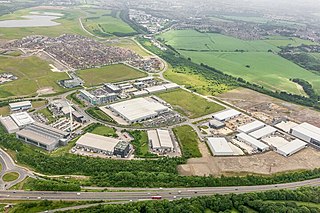
The Advanced Manufacturing Park (AMP) is a 150-acre (61 ha) manufacturing technology park in Waverley, Rotherham, South Yorkshire, England. It was partly funded by the European Regional Development Fund, with Yorkshire Forward, and developed by Harworth Group, previously the property development arm of UK Coal, on reclaimed opencast coal mine land close to the site of the battle of Orgreave.

Steel, Peech and Tozer was a large steel maker with works situated at Ickles and Templeborough, in Rotherham, South Yorkshire, England.
Firth Brown Steels was initially formed in 1902, when Sheffield steelmakers John Brown & Company exchanged shares and came to a working agreement with neighbouring company Thomas Firth & Sons. In 1908 the two companies came together and established the Brown Firth Research Laboratories and it was here, in 1912, under the leadership of Harry Brearley they developed high chrome stainless steel. The companies continued under their own management until they formally merged in 1930 becoming Firth Brown Steels. The company is now part of Sheffield Forgemasters.
Defence Metallurgical Research Laboratory (DMRL) is a research laboratory of the Defence Research and Development Organisation (DRDO). Located in Defence Research Complex, Kanchanbagh, Hyderabad. It is responsible for the development and manufacture of complex metals and materials required for modern warfare and weapon systems.

Hadfields Limited of Hecla and East Hecla Sheffield, Yorkshire was a British manufacturer of special steels in particular manganese alloys and the manufacture of steel castings.
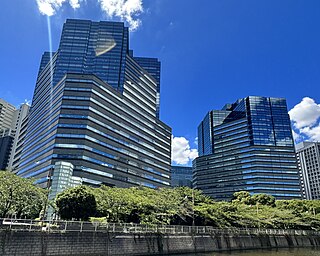
The Japan Steel Works, Ltd. is a steel manufacturer founded in Muroran, Hokkaidō, Japan in 1907.
Carlton Forge Works is an aerospace manufacturing company that produces seamless rolled rings. Carlton was found in 1929 and was privately held. According to Manta and Business Week, the company has about 250-300 employees. The company was previously owned by Allan Carlton.
The Queen's Award for Enterprise: International Trade (Export) (2008) was awarded on 21 April 2008, by Queen Elizabeth II.

Manoir Industries is a global metal processing company mainly focusing on high tech casting and forging components in petrochemical, nuclear, oil and gas, civil engineering, energy, defense, heavy weight trucks, tractors and aerospace markets. Manoir Industries employs 1,400 workers in 7 manufacturing locations in France, United Kingdom, India and China.
The William Cook group is a British steel company headquartered in Sheffield, South Yorkshire, England. It is the UK's largest manufacturer of steel castings.
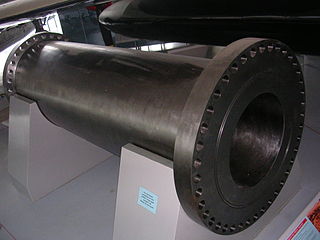
The "Supergun" affair was a 1990 political scandal in the United Kingdom that involved two businesses, Sheffield Forgemasters and Walter Somers, Gerald Bull, members of parliament Hal Miller and Nicholas Ridley, the UK's Secret Intelligence Service, a failed prosecution and components of a "supergun" that the businesses were alleged to have been exporting to Iraq that they and others had contacted the government about in 1988. The collapse of the court case preceded the Arms-to-Iraq case, that involved a different company Matrix Churchill, by four months.
Smith-Clayton Forge Ltd were a company specialising in drop forgings that was established in Lincoln. In 1966 Smith-Clayton Forge became a subsidiary of GKN and later was absorbed into British Steel. It then became part of United Engineering Forgings (UEF) which in 2000 and 2001 was sold on to Wyman Gordon and Bifrangi, who now operate on the Smith-Clayton Forge site.
